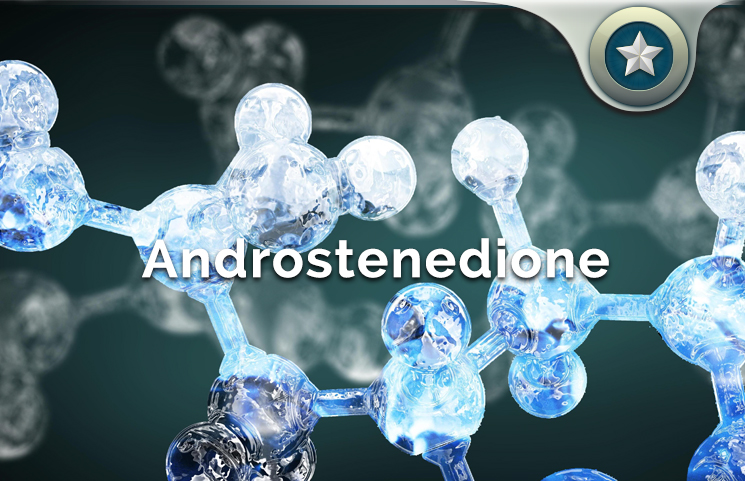Androstenedione is a hormone that the body's adrenal glands produce naturally. It also generated in the ovaries (in women), and the testes (in men).
The body first produces Dehydroepiandrosterone (DHEA), then turns the DHEA into androstenedione, and finally transforms the androstenedione into testosterone, which is the main male sex hormone. Androstenedione is also transformed into estrogen.
In healthy women, around 50% of androstenedione is of ovarian origin and about 50% is of adrenal origin; in men, the adrenal glands constitute two-thirds and the testicles the rest.
The primary clinical use of androstenedione is in the evaluation of hirsutism (abnormal hair growth) which is elevated in about 60% of the cases. Elevated levels of androstenedione can be seen in polycystic ovaries, in congenital adrenal hyperplasia, and in adrenal or gonadal tumors.
Androstenedione is not an essential nutrient – your body manufactures it from scratch. It is found in meat and some plants, but to achieve a therapeutic dose, you need to take supplements.
Androstenedione Therapeutic Uses
Androstenedione was manufactured initially as a dietary supplement, often called andro. Sports Illustrated gave credit to Patrick Arnold as the one who introduced it to the US market.
Andro was legal and could be purchased without a prescription, and therefore it was commonly used in Major League Baseball over the decade of the 90s. It gained popularity as the supplement used by baseball slugger Mark McGwire when he set the major league’s single-season rookie record in home runs. What everyone wonders is whether it helped.
Androstenedione is used by athletes who believe they can build muscle and increase strength with it. It is supposed to improve athletic performance, maintain healthy red blood cells and increase sexual desire and performance. However, there is no evidence that it works.

Androstenedione Classification As An Anabolic Steroid
In the United States, the Anabolic Steroid Control Act of 2004 was introduced in the Senate. This amended the Controlled Substances Act and banned the use of anabolic steroids. Androstenedione was considered as such (surprisingly, given the little evidence of its anabolic properties.) Its sale was already banned there in 2004 by the FDA, claiming that the drug posed significant risks to health associated commonly with steroids.
Many sports organizations have developed policies on sports supplements. The National Football League (NFL), the International Olympic Committee (IOC) and the National Collegiate Athletic Association (NCAA) have banned the use of steroids such as ephedra and androstenedione among their athletes. Androstenedione is also prohibited by the United States Armed Forces.
Androstenedione Safety Issues
There are concerns that androstenedione, like related hormones, might increase the risk of liver cancer and heart disease. To support this last point, there is some evidence that androstenedione can adversely affect cholesterol levels.
Androstenedione intake increases the levels of dihydrotestosterone and estrogen in the blood that has been associated with benign prostatic hypertrophy, baldness, increased risk of cardiovascular disease, various cancers, and gynecomastia in men.
Since androstenedione can raise testosterone levels in women, it may cause them to develop facial hair and other manly pattern changes.
A case report suggests another potential complication with the use of androstenedione. A man who was using androstenedione to “improve” his physique suffered priapism (a painful continuous erection) for over 30 hours, requiring an emergency visit to the hospital.
Previously, while using androstenedione, he experienced a similar episode that lasted 2 to 3 hours and which spontaneously resolved itself. It is not certain that androstenedione was the cause, but it seems the most likely possibility.
A medical study used a daily dose of 300 mg of androstenedione combined with various other supplements and found that there was an increase in muscle strength compared with a control group who did not take supplements.
The researchers speculated that high enough levels could lead to an increase in muscle size and strength.
However, due to the federal prohibition of androstenedione supplements, it is hard to carry out further research into its positive and adverse effects. The study's authors also concluded that people should not use androstenedione supplements due to lack of evidence of beneficial effects, wide variation in individual response to the supplements and the risk of unknown side effects.
As androstenedione is partly converted into estrogen, the people who take this supplement may have estrogenic effects, although none of the studies cited in the previous paragraphs have used doses high enough to draw definite conclusions.

Are Andro Supplements Still Sold?
Most manufacturers stopped producing supplements after Androstenedione was classified as a steroid. However, there are a few out there that use fancy concepts to classify their products.
IronMagLabs Super 1-Andro says it is a “non-methylated prohormone” and is advertised as being able to increase muscle mass and strength.
Blackstone Labs Chosen 1 says it is a “precursor to a powerful testosterone derivative known as 1-testosterone” and advertised as able to “Increase Muscle Mass with no bloating or water retention.”
Primeval Labs 1-Andro says it is “one of the strongest prohormones on the market today” that can “increase your lean muscle mass in the shortest amount of time possible”.
Lg Sciences 1-Andro is advertised as “excellent for a cutting cycle or stacking with other prohormones when your end goal is to get stronger and leaner.”
Androstenedione Review Summary
The appropriate dose of androstenedione depends on several factors such as the user's age, health, and several other conditions. At this time, there is not enough scientific information to determine an appropriate dose range for androstenedione.
Consider that even natural products are not always necessarily safe and dosages can be important.
It's your duty to research in a rigorous and responsible manner, to the extent possible, that the supplements you buy and consume are suitable for your sports objective and that scientific studies back the benefits that it says it provides. Don't just blindly believe what is printed on the label.
Consult your pharmacist or physician or other health professionals before using any supplement.
This article is neither intended nor implied to be a substitute for professional medical advice. Always seek the advice of your physician or other qualified health providers prior to starting any new treatment.









